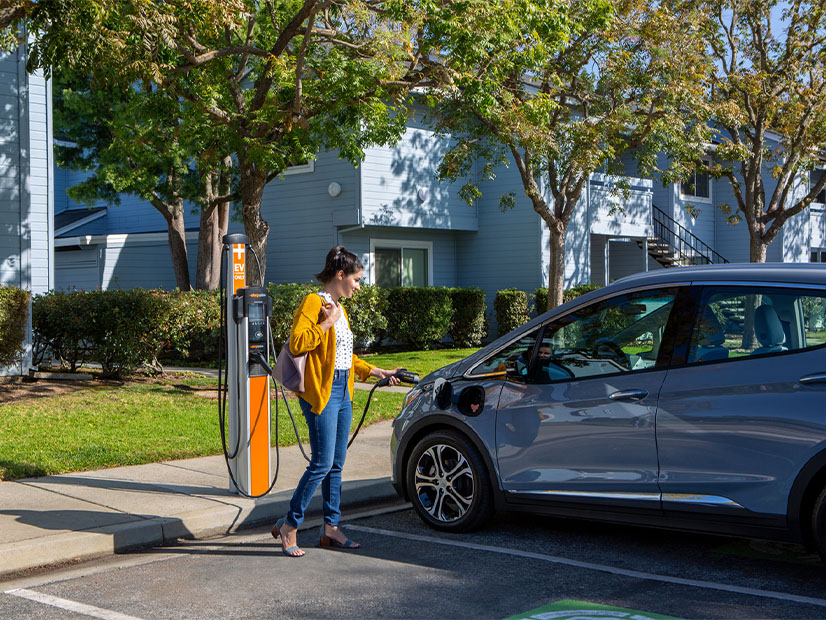
A new bill that would ensure Connecticut’s condominium owners and renters can access electric vehicle charging at home is “inappropriate” as written, an attorney told legislators Thursday.
Andrea Dunn, a condominium association lawyer at Bender, Anderson and Barba, said the “one-size-fits-all nature” of the bill fails to address the “vast difference” between condos.
The Joint Energy and Technology Committee took up the bill (H.B. 5117) at the request of the Department of Energy and Environmental Protection (DEEP) and accepted comments on it during a public hearing.
“This legislation would … provide a process through which residents can seek approval for charging equipment installation while simultaneously protecting the property interests of associations and landlords,” DEEP Commissioner Katie Dykes said in testimony.
As written, the bill would prevent associations and property owners from restricting unit owners and renters from installing chargers, and it sets out the parties’ responsibilities for their installation.
“In short, this bill places financial responsibility solely on the unit owner or tenant,” Dykes said. Six other states, she added, have enacted right-to-charge laws in recent years that apply to associations and rental properties.
Committee members acknowledged the bill’s importance to the state’s EV goals during a legislative session preview hosted by the Connecticut Power and Energy Society on Wednesday.
“This bill will allow an owner or tenant to approach their association or landlord and petition for a charging station,” ranking committee member Rep. Charles Ferraro (R) said during the event.
Establishing a right-to-charge law for the people living in condos and rental properties is complicated. Condos are “common interest ownership properties,” and what one owner does affects other owners, committee co-Chair Sen. Norm Needleman (D) said at the event.
The intentions of the bill, Dunn said, are good, but it would not allow for the “unique makeup” of condo communities that may have no space for charging stations or immediate access to an electrical source. It also interferes with the authority of associations’ governing documents, she said.
One of Connecticut’s largest property owner organizations opposed the bill’s approach to forcing business decisions on property owners and its ambiguity over cost responsibilities. The bill is not clear, for example, about what would happen to the charging equipment after a tenant moves, it said.
EV charging as an amenity for renters “should be left to the property owners and the tenants to negotiate for themselves,” John Souza, president of the Connecticut Coalition of Property Owners, said in testimony. The free market, he said, should set the pathway for EV charging.
Needleman suggested during the hearing that representatives of the real estate community could help the committee as part of a working group to craft more suitable language for the bill.
Hydrogen Study
The committee will take public comments this week on a priority bill (H.B. 5200) that it introduced Wednesday to create a task force for studying hydrogen in the state.
“We have … all the ingredients to create a very vibrant green hydrogen hub in the region,” committee co-Chair Rep. David Conti (D) said during the legislative preview.
One of the task force mandates would be to examine how the state can take advantage of incentives for hydrogen under the Infrastructure and Investment Jobs Act (IIJA), which included $8 billion in funding over five years to develop Regional Clean Hydrogen Hubs. A U.S. Department of Energy request for information issued earlier this month seeks input on the hydrogen hub funding solicitation process.
The task force would submit its study to the legislature in January 2023 so that the committee can “craft policy” to “incorporate Connecticut into a hydrogen future,” Conti said.
U.S. Sen. Charles Schumer (D-N.Y.) is already taking steps to position New York as the center of a hydrogen hub. In a Feb. 15 letter to Energy Secretary Jennifer Granholm, Schumer urged DOE to work closely with the state as the department begins to implement the hydrogen hubs program.
Four Western states have also made a move to compete for the IIJA funds, signing an agreement Thursday to develop a Western Inter-States Hydrogen Hub. (See related story, Mountain States Partner to Secure Hydrogen Hub.) And in Washington, the State Senate unanimously passed a bill Feb. 12 to create a state office that would support hydrogen development and help put the state in the running for a hub designation. (See related story, Fast-moving Bill Seeks to Win Hydrogen Hub for Wash.)


